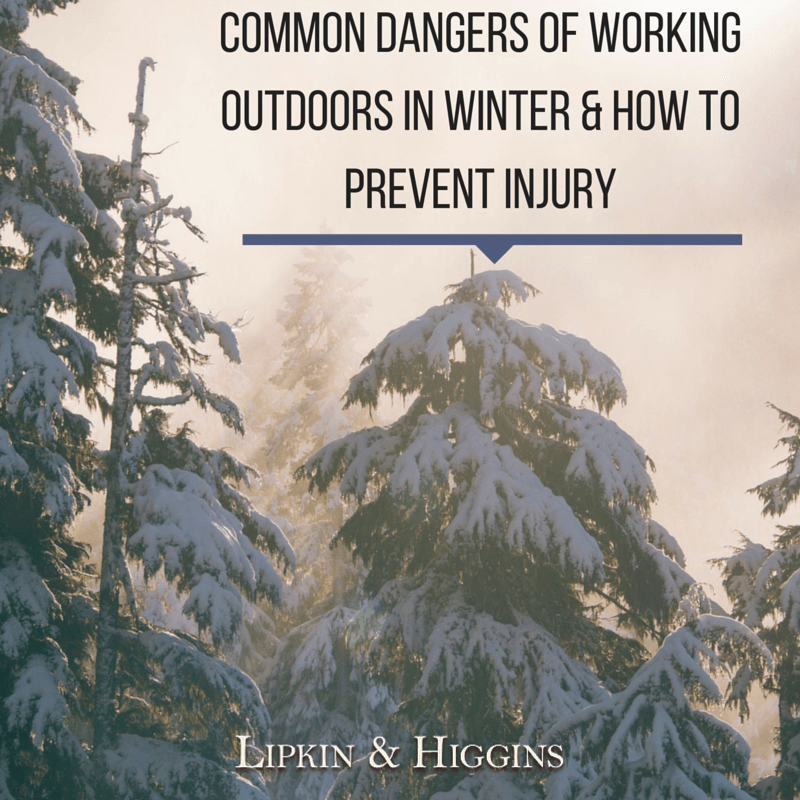
Living in Illinois, as well as the other snowbelt states, means that snow, sleet, rain and colder temperatures are inevitable. If you have a job that requires you to be outside for extended periods of time, for example, as a construction worker, it's important to be cognizant of the dangers that working outdoors in winter can pose. Being aware of common safety threats that come with winter weather is the first step in preventing a workplace injury.
Poor Travel Conditions
Safety precautions must be taken before even beginning work for the day, as winter driving when road conditions are poor can be dangerous. No matter the season, it's crucial to focus on the road at all times and to never give in to distracted driving, however this is especially important when roads are snowy and icy. In addition, plan ahead by keeping an emergency kit in the car to have on hand in case of a break down:
- Blanket, warm hat, gloves, old boots & warm clothes
- Spare tire & tire repair kit
- Booster cables
- Fire extinguisher
- Ice scraper & mini shovel
- Bag of sand to assist when traction is poor
- Extra windshield washer fluid (suitable for temperatures below freezing)
- First aid kit
- Map
- Flares
- Non-perishable snacks, such as granola bars
Slips & Falls
According to the National Floor Safety Institute, falls account for over 8 million emergency room visits, representing the leading cause of visits, and are the leading cause of workers’ compensation claims. During winter, slick roads, walkways and sidewalks only increase the chance of slips and falls happening, which is why it's important to make sure your work zone is safe. Putting down salt or sand in your work area helps reduce the risk of slipping, but if you're not able to cover your work space's entirety, take precaution by walking slowly and avoiding obstacles that increase the chance of slips and falls.
Hypothermia
When individuals are exposed to the cold, the body will lose heat faster than it is able to produce it, so extended periods of time outside during winter can result in hypothermia. Hypothermia is more common when temperatures are bitter, but can also happen at temps above freezing, such as when people are working in clothes that are wet from sweat, snow or rain. According to the Center for Disease Control and Prevention (CDC), warning signs of hypothermia in adults include shivering, exhaustion, slurred speech, confusion and drowsiness. In order to help prevent hypothermia, stay warm by wearing layered lightweight clothing with a water-repellant outer layer, get out of wet clothing as soon as possible, wear a hat and mittens, and go indoors to warm up when needed.
Frostbite
Certain areas of the body can be affected by the cold more than others and can even become frozen, which is known as frostbite. Ears, toes, fingers, cheeks, the nose and the chin are all areas that are commonly impacted by frostbite. According to the CDC, signs of frostbite include numbness, firm or waxy feeling skin, or white or grayish-yellow skin. If you’re working outside for extended periods of time, be sure to dress in layers, wear wool socks and waterproof boots, protect your ears and face with a hat or face mask, wear insulated mittens or gloves and go indoors to warm up when necessary.
Overexertion
If your profession requires heavy lifting or other strenuous activities, know that cold weather puts an extra strain on the body. In cold temperatures, the body already works hard to stay warm, so forcing other laborious activities means it has to work that much harder. In order to avoid overexertion, work slowly and take frequent breaks to allow your body to rest.
Staying safe and preventing injury begins with knowing the dangers of working outdoors in the winter. If you have been injured on the job and believe you may be entitled to workers' compensation, contact the personal injury attorneys at Lipkin & Apter to schedule a free consultation.
